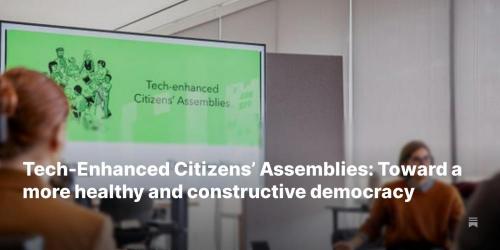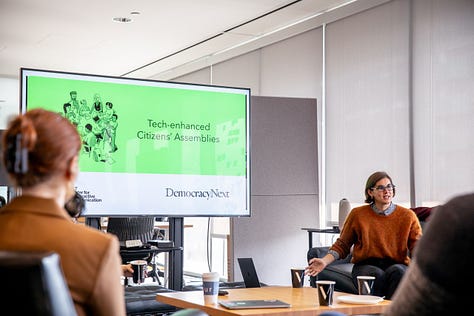
https://demnext.substack.com/p/tech-enhanced-citizens-assemblies
In an era of technological transformation in which social media and generative AI are disrupting our processes of communication and democracy, the MIT Center for Constructive Communication (MIT CCC) and DemocracyNext have launched a two-year pop-up lab to harness powerful technologies to create positive, constructive, human-led systems shaped by the proven model of Citizens’ Assemblies worldwide.
This two-year pop-up lab will explore ways to use new technologies to improve all three phases of the assembly process: preparation for the assembly, what happens during the assembly, and post-assembly follow up. To achieve this, we will design and prototype new technologies, as well as evaluate existing technologies developed by CCC and its close non-profit collaborator Cortico. The goal is to promote transparency and understanding of the Citizens’ Assembly process, helping to build trust and legitimacy.





Specifically, we are proposing these research activities for the three phases of the assembly process: Setup (Before the assembly) Enable and amplify community engagement by capturing diverse communities’ voices and experiences to inform the deliberation process AI-powered sensemaking and synthesis of analytic listening to embed community voice into the deliberation process Improve the process of preparing learning materials, making it easier for organizers, and more engaging for the assembly members Deliberation (During the assembly) Enhance the group building process of icebreakers and identifying shared values Enable the learning experience to be more effective and engaging Support deliberation in both small group conversations and plenaries AI-powered sensemaking and visualization to enable visible connections between small group conversations and plenaries and help assemblies quickly and more effectively analyze and synthesize Support the process of finding consensus on shared recommendation Support the transition from deliberation and proposition of general ideas to the drafting of specific recommendations Deliverables (After the assembly) Develop publicly accessible and visual archives of the deliberation process, grounded in citizens’ voices, to document the deliberation process Allow transparency, visibility, and a deeper understanding of the deliberation process that will help garner trust and legitimacy (see output examples from MIT CCC/Cortico projects using their technology in NYC and in Boston) Our proposed timetable is: In year one, as an initial proof of concept, the two organizations will design and implement a Tech-Enhanced Student Assembly at MIT as a model for reimagining constructive communication and democratic deliberation for – and with – the next generation. This model Citizens’ Assembly will offer a hands-on, experiential learning opportunity for MIT students through a simulation of a Tech-Enhanced Student Assembly. We will then test and evaluate the potential of this model to scale through a high-impact field pilot in 2024 in Bend, Oregon. In year two, we would like to expand on what we learned in 2024 to continue prototyping, testing, and evaluating the tools and methods to extend features and capabilities of the technology that can become a key infrastructure to support Citizens’ Assemblies. About MIT CCC The MIT CCC, based at the MIT Media Lab, is designing and prototyping state-of-the-art tools, methods, and systems that connect rather than divide us to create a healthier society. These systems build the foundations for a civic infrastructure that, in the context of Citizens’ Assemblies, amplifies community engagement and input, enhances all phases of the deliberation process, and allows transparency and visibility. (Watch the video below for an example of at MIT CCC’s work.) MIT CCC’s unique collaboration with the non-profit organization Cortico enables collaboration on IP, prototyping, and field pilots allowing the use of the Fora, a dialogue and listening platform designed to enable bringing communities together for listening, understanding, and sharing. Grounded in voice, the technology builds on constructive communication practices that trace back to ancient wisdoms of facilitation and dialogue that are uniquely paired with AI-supported tools that allow listening and sensemaking at scale. About DemocracyNext DemocracyNext believes in a more just, joyful, and collaborative future, where everyone has meaningful power to shape their societies. We are an international research and action institute with a mission to shift political and legislative power to people in new democratic institutions such as Citizens’ Assemblies. The DemocracyNext team is at the forefront of international research and design of Citizens’ Assemblies, having led the OECD’s flagship studies analyzing 600 examples across the globe, establishing international standards of good practice, and designing the world’s first permanent Assemblies anchored in law. DemocracyNext is working to develop the tools, resources, and capacity-building programs that build the field to enable a systemic shift, with many more permanent Citizens’ Assemblies existing across the globe. The Tech-enhanced Citizens’ Assembly Pop-Up Lab is co-led by Dimitra Dimitrakopoulou (MIT CCC) and Claudia Chwalisz (DemocracyNext). If you'd like to learn more about this initiative, contact them: at claudia@demnext.org or dimitrad@media.mit.edu. We can also announce that we will be working with MIT to run a model Tech-enhanced Student Assembly with MIT students in January about the issue of how generative AI is integrated into education and its implications for the future of learning!









